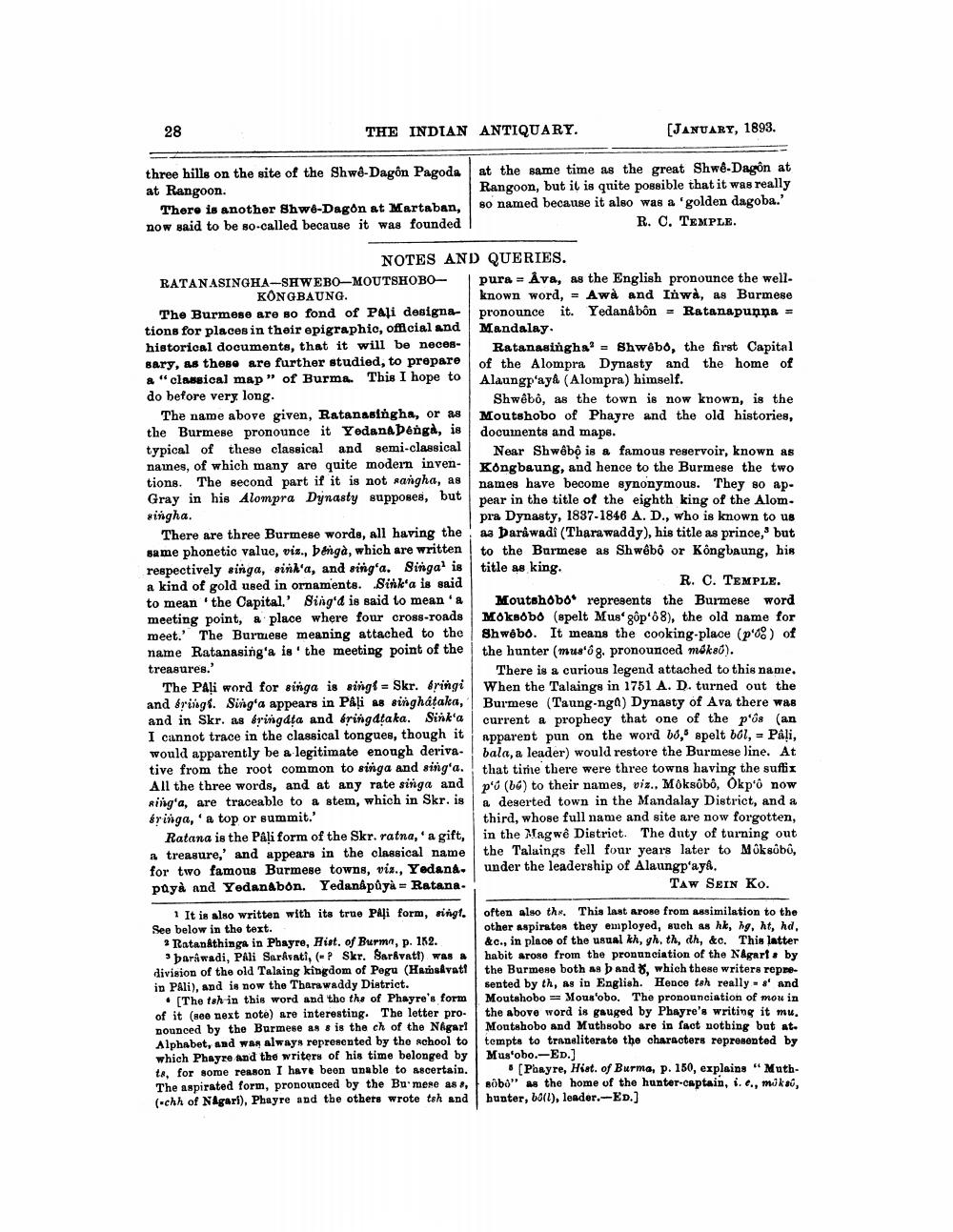________________
28
THE INDIAN ANTIQUARY.
(JANUARY, 1893.
three hills on the site of the Shwe-Dagon Pagoda at Rangoon.
There is another Shwd-Dagon at Martaban, now said to be so-called because it was founded
at the same time as the great Shwê-Dagón at Rangoon, but it is quite possible that it was really so named because it also was a 'golden dagoba.'
R. O. TEMPLE.
NOTES AND QUERIES. RATANASINGHA-SHWEBO-MOUTSHOBO | pura = Ava, as the English pronounce the wellKONGBAUNG.
known word, - Awd and Inwà, as Burmese The Burmese are so fond of PAli designs- pronounce it. Yedanabon - Ratanapunna = tions for places in their epigraphic, official and Mandalay. historical documents, that it will be neces- Ratanasinghs - Shwebo, the first Capital sary, as these are further studied, to prepare of the Alompra Dynasty and the home of a "classical map ” of Burma. This I hope to
Alaungp'aya (Alompra) himself. do before very long.
Shw6b8, as the town is now known, is the The name above given, Ratanasingha, or as Moutshobo of Phayre and the old histories, the Burmese pronounce it Yedana Denga, is documents and maps. typical of these classical and semi-classical Near Shwebo is a famous reservoir, known as names, of which many are quite modern inven
Kongbaung, and hence to the Burmese the two tions. The second part if it is not sangha, as
names have become synonymous. They so apGray in his Alompra Dynasty supposes, but pear in the title of the eighth king of the Alom. singha.
pra Dynasty, 1837-1846 A. D., who is known to us There are three Burmese words, all having the aa Darawadi (Tharawaddy), his title as prince, but same phonetic value, vie., benga, which are written to the Burmese as Shwebo or Kôngbaung, his respectively singa, sivk'a, and sing'a. Singa' is title as king. a kind of gold used in ornaments. Sinka is said
R. C. TEMPLE. to mean the Capital.' Singid is said to mean'a Moutshobo represents the Burmese word meeting point, a place where four cross-roads Moksbo (spelt Mus' gộp'68), the old name for meet.' The Burmese meaning attached to the Shwebo. It means the cooking-place (p ) of name Ratanasing'a is the meeting point of the the hunter (mus'ó 8. pronounced máks). treasures.
There is a curious legend attached to this name. The PAli word for singa is singf = Skr. bringi When the Talaings in 1751 A. D. turned out the and bringt. Sing'a appears in Påļi as singhataka, Burmese (Taung-nga) Dynasty of Ava there was and in Skr. as bringdta and bringataka. Sink'a current a prophecy that one of the p'ós (an I cannot trace in the classical tongues, though it
apparent pun on the word 60,9 spelt bol, - Pali, would apparently be a legitimate enough deriva- bala, a leader) would restore the Burmese line. At tive from the root common to singa and sing'a. that time there were three towns having the suffix All the three words, and at any rate singa and p's (16) to their names, vis., Moksôbô, Okp'o now Ring'a, are traceable to a stem, which in Skr. is a deserted town in the Mandalay District, and a &ringa,' a top or summit.'
third, whose full name and site are now forgotten, Ratana is the Paļi form of the Skr. ratna,' a gift, in the Magwê District. The duty of turning out
treasure,' and appears in the classical name the Taluings fell four years later to Mók sobů, for two famous Burmese towns, vis., Yedana. under the leadership of Alaungp'aya. paya and Yedanabon. Yedanapûyà = Ratana.
TAW SEIN Ko.
1 It is also written with its true PAļi form, ringt. See below in the text.
Ratanathinga in Phayre, Hist. of Burma, p. 162.
baráwadi, PAli Saravati, (HP Skr. Barkvatt) was a division of the old Talaing kingdom of Pegu (Hans vati in PAli), and is now the Thara waddy District.
[The tsh in this word and the ths of Phayre's form of it (neo next note) are interesting. The letter pro- nounced by the Burmese as & is the ch of the Nagar! Alphabet, and was always represented by the school to which Phayre and the writers of his time belonged by ta, for some reason I have been unable to ascertain. The aspirated form, pronounced by the Burmese as, (ochh of Nagari), Phayre and the others wrote tsh and
often also th. This last arose from assimilation to the other aspiraton they employed, such as hk, ny, ht, hd, &c., in place of the usual kh, yh, th, dh, &c. This latter habit arose from the pronunciation of the Nagart by the Burmese both a band, which these writers represented by th, as in English. Hence tsh really - ' and Moutahobo = Mous'obo. The pronounciation of mou in the above word is gauged by Phayre's writing it mu. Moutahobo and Muthsobo are in fact nothing but at. tempts to transliterate the characters represented by Mus'obo.-ED.)
(Panyre, Hist. of Burma, p. 150, explains "MuthBobo" as the home of the hunter-captain, i.e., maksu, hunter, bo(l), leader.-ED.)




